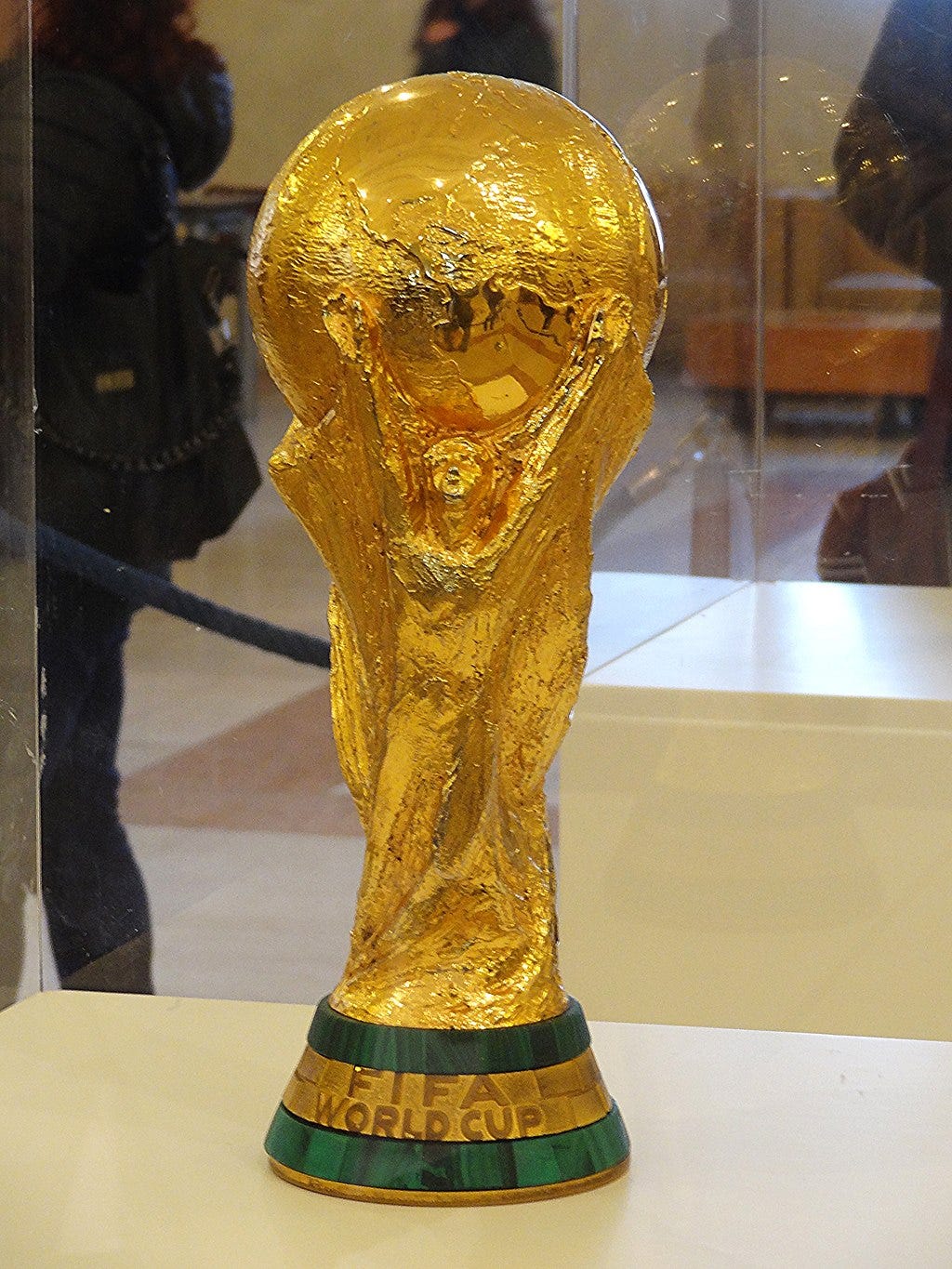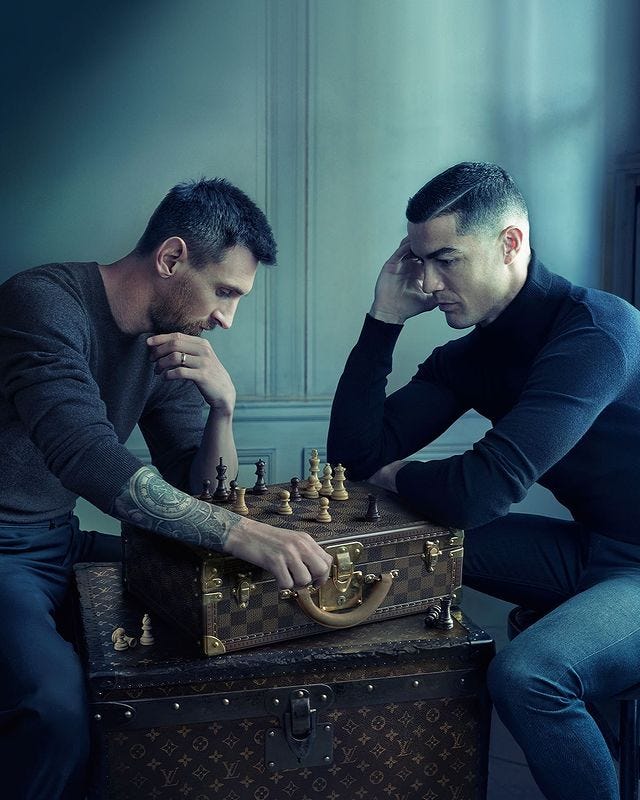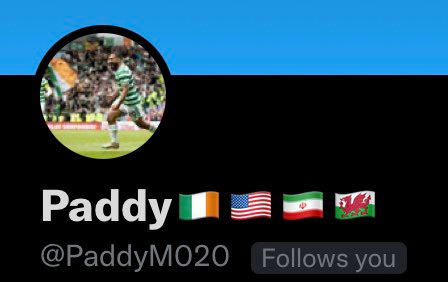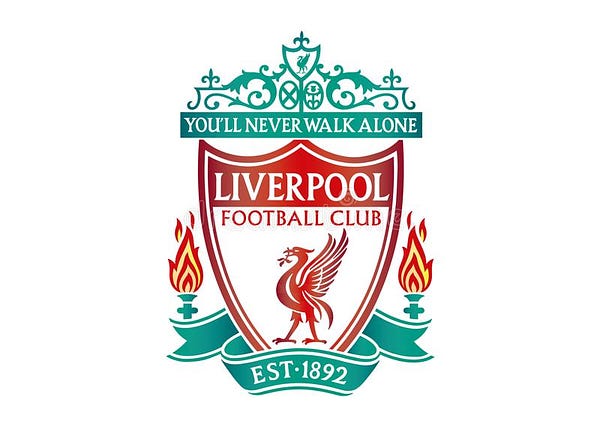“Today I feel Qatari. Today I feel Arab. Today I feel African. Today I feel gay. Today I feel disabled. Today I feel [like] a migrant worker. And I feel this, all this, because [of] what I’ve been seeing and what I’ve been told, since I don’t read — otherwise I would be depressed, I think.” -Gianni Infantino, president of FIFA, rebuffing (?) criticism of Qatar as hosts of the World Cup

In different circumstances, the narrative surrounding this World Cup would have been scintillating. A final turn round the ferris wheel for a huge collection of modern legends, and a few all-time ones too. Thomas Müller’s last dance. Robert Lewandowski’s. Karim Benzema’s. Luka Modrić’s. The Cannibal’s. Possibly Neymar’s. And, of course, the last dance of those two members of the capra genus, who launched the tournament with an internet-breaking Annie Liebovitz photoshoot. (That case on which they’re playing chess? The custom Louis Vuitton case in which the trophy is held, of course.)
Alas, the venerable institution which presides over global football had other ideas. FIFA’s decision in 2010 to assign this year’s iteration of the nearly century-old tournament to a nation barely half the size of New Jersey, situated in brutal desert heat, inspired bewilderment from the very start. Qatar is a nation which possessed none of the infrastructure necessary for such a tournament before the announcement and none of the football culture one expects from a host (their nation had never before qualified for a World Cup). That bewilderment has only accelerated, through the years of reports of torrid conditions faced by migrant workers building brand new stadiums, through revelations of the bribery and corruption underpinning Qatar’s successful bid (surprise!), through the decision to move the tournament from its customary summer position to the middle of the winter (i.e., the middle of the season for most major leagues) instead.
Instead of petering out as the haze of football shrouds all else, that bewilderment instead reached a fever pitch in the days preceding this bizarre, alternate-universe version of our beloved and iconic competition. Imagine the surprise of AB InBev, maker of Budweiser, one of the tournament’s long-time chief sponsors, when the Qatari government reneged on their promise to allow purchases of alcohol in and around stadia. Imagine the surprise of Jewish football fans when the Qatari government reneged on their promise to allow cooked kosher food to be sold at tournament facilities.
All of the above, bar perhaps the last point, are criticisms that are separate from those associated with the cultural situation in Qatar: the prevailing illegality of homosexuality, along with the restrictions on the ability of women to work, study, and travel without express permission from a man. The typical argument is that it is unfair and unjust to forcibly impose Western norms on countries from very different religious and cultural backgrounds. Merited as this may be in arguments against interventionism, this is not such an argument. This is an argument about the hosting duties of a World Cup, a global event in which all (qualifying) nations are invited to revel in the glory of football together. It is the host’s duty to respect the myriad cultures being represented at this global event, not vice versa. That is what you signed up for. Go ahead and impose your doctrines on your own citizens. But do not turn indignant when you are called out on them, for it is you and you alone who have fixated the magnifying glass on yourself. FIFA’s complicity in the host’s attempts to stamp out protests by visitors and players, with its ban on rainbow armbands and its removal of the “Love” tag from Belgium’s jersey, is particularly odious, albeit unsurprising. Its moral deficiency was never a mystery.
There is some solemness, then, with which my World Cup fever strikes this year. The troubling circumstances around the tournament, difficult to ignore at its last iteration (hosted by Russia before it went full pariah, but well after Putin’s annexation of Crimea), are now so brutally unavoidable that their presence lingers over every match. Perhaps it was always a fantasy that these type of global events could be a uniting force, healing international divides with the triviality of sport. Yet that old fairy tale we tell, that which ostensibly justifies the existence of these events, has rarely rung more hollow.
Starting from such a trough, it will take a truly supreme amount of footballing magic to raise the air of grimness hanging over this enterprise, to replace it with that air of wonder which has filled me and my fellow fans with joy since we began watching the tournament (2010 South Africa, I’ll never forget you). If the first set of matches are any sign, there is some hope yet.
Qatar 0-2 Ecuador
A damp squib of a match in which the hosts truly looked the part, insofar as the part is a Sunday league club made up of weekend warriors without a shred of tactical acumen or skill. That is not entirely fair to the Qataris: in the second half, they looked a touch more like a moderately organized U9 team. Their defensive fallibility, with open space wide as the eye could see, was matched only by a remarkable propensity to lose all motor functions upon entering attacking third. The hosts were spared a more damaging scoreline only by virtue of the injury sustained around the hour mark by double goalscorer Enner Valencia, who followed up a clinical penalty (one he himself drew) with a glorious, perfectly placed glancing header. Was the conceded penalty an entirely avoidable goalkeeper error, and was he completely unmarked on his header? We won’t focus on that. Though only two appear on the scoresheet, he had the ball in the net thrice, the first time within 3 minutes of the match beginning but which was overruled in bizarre (though ultimately correct) circumstances by our good old friend VAR. Let the Golden Boot hunt commence!
England 6-2 Iran
Gareth Southgate’s lads have gotten perilously close to winning international tournaments since the waistcoast king’s 2016 appointment as manager, getting to the semifinal in Russia in 2018 and the final of Euro 2020. Is this their time? Much to the frustration of quite literally everyone else on the planet (myself very much included), it could well be “coming home.” This was an imperious performance from a squad that I find hard to dislike despite my best efforts. Iran, by all accounts a more than decent squad, looked utterly hapless in the face of the creative assault unleashed by the electric English midfield. The result felt inevitable even before 35th minute opener, a sumptuous and skillful header from 19-year old (!) Jude Bellingham. It was finished after Bukayo Saka’s first goal eight minutes later, a bar-down volley from just inside the box that’s been playing on a loop in my head since he unleashed it. The dam had burst; the remaining goals, including those they conceded, were but an epilogue to a script whose conclusion had come and gone.
Word to the wise: fear England. Their squad depth is absurd (Phil Foden, Marcus Rashford and Jack Grealish came off their bench). Out of form players transform into indefatigable titans when dressed in their all whites (loth as I am to admit it, bane of my existence Harry Maguire had a brilliant day out). They are going further than anyone more than an hour’s drive from Leicester would like to see.
Senegal 0-2 Netherlands
Netherlands come to this World Cup with some fanfare, largely driven by the unbelievable narrative surrounding their manager Mr. Louis van Gaal. This is a man who kept a diagnosis of aggressive prostate cancer from his team during their qualifying campaign, so as to minimize distractions for the players. That type of tenacity itself ought to be frightening for any team lining up against his squad, much less a team like Senegal which is missing its star player, the injured Ballon d’Or runner up Sadio Mané. Yet what a fight they put up! The first half was taut and tense, with neither team able to make inroads into the other’s steadfast defense. That tension devolved into a touch of idleness through the second half, with the teams seeming to lose urgency in possession in spite of the deadlock. If anything it seemed as though Senegal would be the team to break through, as they punctuated the stillness with a couple of threatening shots forcing sharp saves from the Dutch keeper Andries Noppert. Yet against the run of play came a clever back-of-the-header over the keeper from attacking midfielder Cody Gakpo, whose stellar run of form in the Eredivisie (9 goals in 14 games for PSV Eindhoven this season) is showing no signs of abating. The extra goal came in the final minute of added time, and created a wider gulf in the scoreline than was demonstrated on field.
USA 1-1 Wales
Soccer vs. football, round one, ended in a draw – a fair, if unsatisfying result. The USMNT began brightly and sprightly, running riot around the Welsh with a youthful energy and attacking dynamism, even if appearing a bit frantic at times. Christian Pulisic, whose troubles finding a place in the starting lineup at Chelsea inspire consternation for legions of American fans, showed the full breadth of his vision, producing incisive pass after incisive pass until finally Tim Weah got onto the end of one and made no mistake while one-on-one with the keeper. Wales, however, caught on in the second half, and their tight man marking of Pulisic shut down the Americans’ source of creativity and thus their goalscoring capacity. Indeed, the US managed only one shot on target in the whole match (the aforementioned Weah goal); in the effective absence of Pulisic, their game plan seemed to rely on overoptimistic crosses into the box, despite the lack of a formidable attacking presence to get on the end of them. Gareth Bale did well to draw and finish the penalty which tied the game, and the final fifteen minutes (about ten of which were added time) of the match were more tense than the US would have hoped on the back of their dominant first half performance. The team is young, and with youth comes growing pains. There is more to learn, including how to adapt when one’s game plan is not working. But very promising signs for these young Eagles – they may be too green this tournament, but watch out in 2026, when they will be both hosts and ripened.
(A programming note: Sorry for the nearly two month radio silence! Please take this video below as a token of my apology.)










